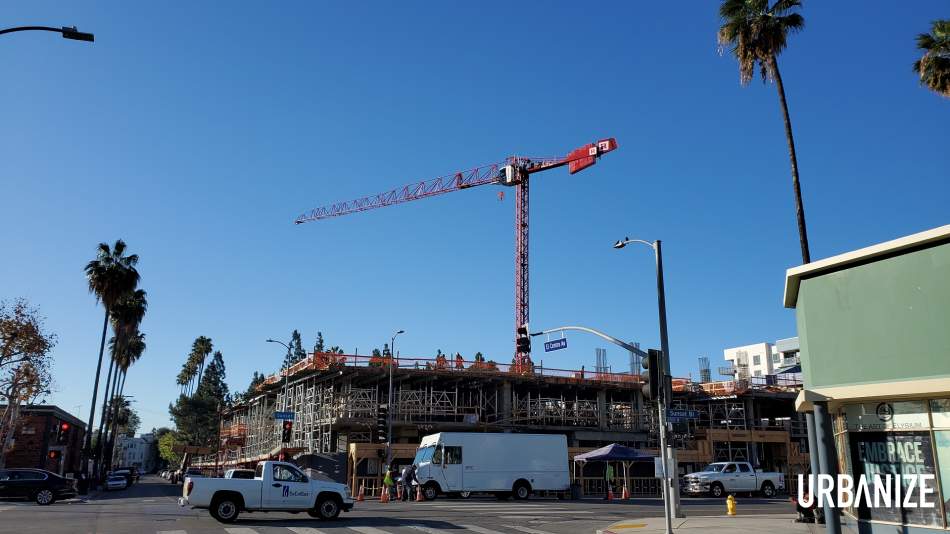Faced with a daunting housing shortage and a corruption scandal that has shaken faith in the land use approvals process, the Los Angeles City Council may place the decision of how and where to build more homes in the hands of its constituents.
In a 13-1 vote, the Council moved earlier today to instruct the Planning Department, Housing Department, and Chief Legislative Analyst to explore methods for expediting an update to the city's zoning code - including a potential ballot measure. The proposed ordinance or measure, which was initiated via a motion last year by Council President Nury Martinez, is expected to include mechanisms for the City of Los Angeles to meet its 6th Cycle Regional Housing Needs Assessment obligation of building at least 450,000 new homes by 2029.
 Construction of new apartments on Sunset Boulevard in HollywoodUrbanize LA
Construction of new apartments on Sunset Boulevard in HollywoodUrbanize LA
“Restoring the public’s trust in our City government is job one and we are taking steps today to close loopholes that corrupt individuals might use to their advantage,” said Martinez in a news release. “However, our city's planning process has failed many in this city long before the recent corruption, favoring the wealthiest and most connected while working people were left wondering how a project got approved in their neighborhood. These actions further equity by leveling the playing field through creating a more transparent, accessible system and ensuring that housing is built in every neighborhood.”
The proposed ordinance or measure, according to instructions put forth by the Council, would be modeled after the Transit Oriented Communities (TOC) guidelines, an affordable housing incentive tool which was approved by Los Angeles voters in 2016 as part of Measure JJJ. The TOC program, which is itself modeled after the statewide density bonus law, permits developments that include on-site affordable housing to exceed certain zoning limits on characteristics such as building height, setbacks, and floor area. The citywide program would also include elements to incentivize the creation of jobs, parks, and mobility projects, although the precise mechanisms for doing so have not been specified at this point in time.
Under the proposed measure, the allocation of new housing would be apportioned throughout the city based on proximity to employment districts and transit lines. Incentives for new housing near job-rich zones and transit corridors were tenets of a series of unsuccessful bills proposed by San Francisco State Senator Scott Wiener over the past three years. However, each of his attempts to pass legislation have fallen short, due in large part to opposition from Southern California lawmakers - including members of the Los Angeles City Council.
In discussion over a ballot measure, Councilmembers Mike Bonin and Paul Koretz - who cast the lone "no" vote - cautioned that proposed ballot measure could lead to a proliferation of luxury developments, rather than affordable housing.
A report on the proposed ballot measure is expected within 30 days.
Consideration of the potential ballot measure was coupled was coupled with two other policy changes which originated last year in response to the federal corruption probe that has enveloped ex-Councilmember Jose Huizar and a series of real estate developers.
 A proposed hotel and condominium tower in Downtown Los AngelesCity of Los Angeles
A proposed hotel and condominium tower in Downtown Los AngelesCity of Los Angeles
The Council voted 9-5 to develop new procedures permitting large, high-value developments requiring discretionary entitlements to bypass the Planning and Land Use Management (PLUM) committee, proceeding directly to a vote by the full Council. Huizar, who is now facing federal charges as a result of the investigation, allegedly used his role as chair of the PLUM committee to solicit financial benefits and campaign contributions from developers seeking approvals such as zone changes and general plan amendments.
The possibility of larger-scale projects skipping PLUM was also subject to pushback from Bonin and Councilmember Gil Cedillo, both of whom argued that the reduction of the committee's role would reduce the amount of public input and scrutiny placed on new developments - the opposite of the motion's written intent.
Councilmembers Paul Krekorian and Bob Blumenfield spoke in favor of the proposal, arguing that limiting PLUM's role would reduce opportunities for future abuse of the committee's schedule for financial gain or politial gain.
Councilmembers Nithya Raman and Monica Rodriguez - who both cast "no" votes - countered that the arguments relating to PLUM could also be made about any other Council committee, and that moving consideration to Council would simply change the decision maker setting the calendar.
Koretz, who stated that a committee chair had repeatedly stonewalled his proposals in the past, argued in favor of adding a requirement that legislation must be considered within a certain amount of time, rather than leaving the scheduling at the discretion of the relevant committee chair.
Blumenfield, in response, cautioned against automatically moving items forward after a designated period of time if they are not "fully cooked," but suggested that improved mechanisms for "extricating" projects from the committee level could provide a solution.
 View of Los Angeles City Hall from Grand ParkWikimedia Commons
View of Los Angeles City Hall from Grand ParkWikimedia Commons
In a unanimous vote, Council also signed off on a proposal to update the criteria for consideration of certain entitlements - specifically conditional use permits and those requiring legislative actions - and sets new protocols for communications between developers and Council offices outside of official meetings.
The issue of ex parte communications between developers and city officials has reared its head before. Nearly four years ago, Los Angeles Mayor Eric Garcetti banned such interactions between city commissioners and developers in the wake of Measure S, a failed ballot initiative which attempted to limit the city's ability to grant discretionary entitlements for private real estate projects.
Reports back on the latter two items are scheduled for a future meeting of the Council. Shoudl the Council vote to implement those updated rules and procedures, they would then take effect.
In separate votes, the Council also directed the city's Housing Authority and Housing Department to take steps to acquire up to 10,000 units of housing by 2030, and initiated a asked the Planning Department o draft a new incentive program in which developers would pay into a rental assistance fund for low-income households.
- City Council Proposes Tweaks to L.A. Development Process (Urbanize LA)






